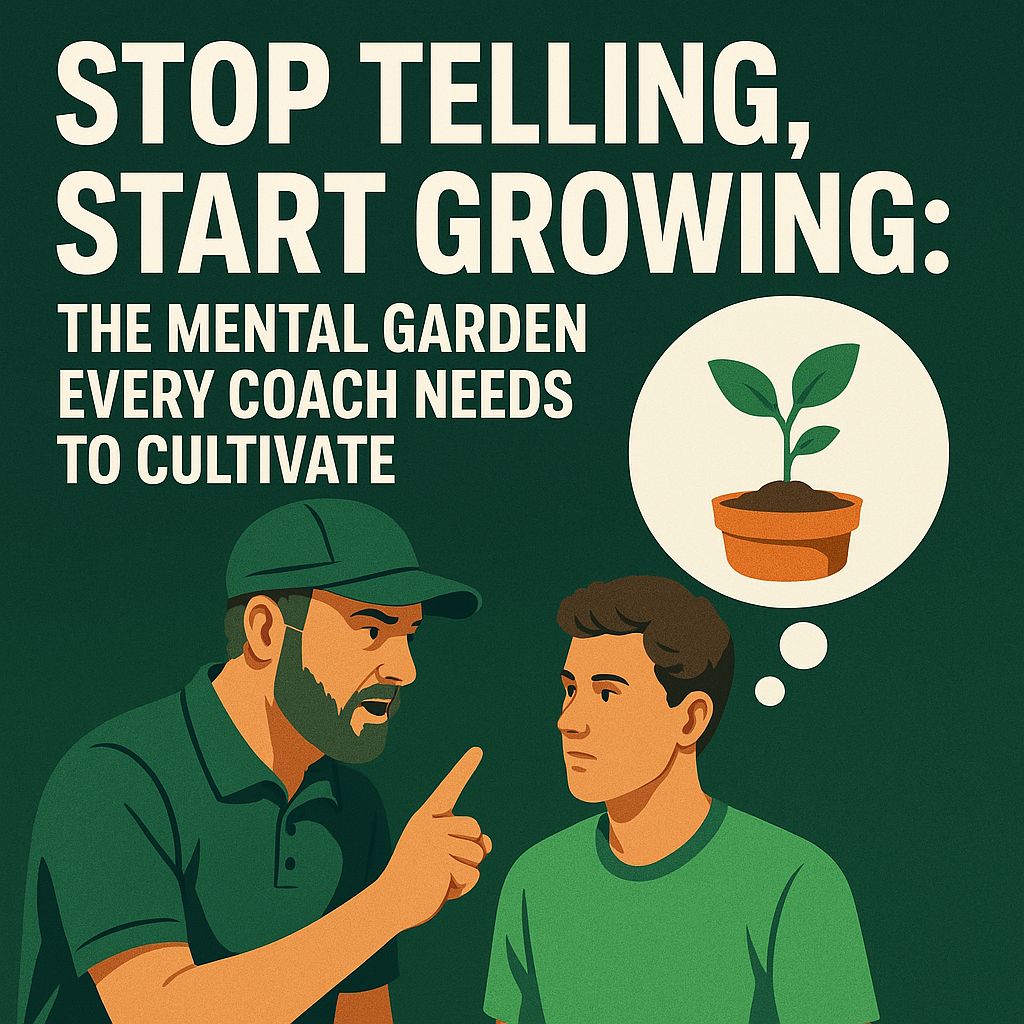- Thoughts On Thursday
- Posts
- Stop Telling, Start Growing: The Mental Garden Every Coach Needs to Cultivate
Stop Telling, Start Growing: The Mental Garden Every Coach Needs to Cultivate

There's a moment every coach knows all too well.
You have been telling your midfielder the same thing about their movement off the ball for weeks. Different words. Same message. Game after game, the execution fails.
Frustrated, you finally try something different. Instead of another demonstration, you start with a simple question: "What do you see when the opposition starts to press us?"
The player pauses. Thinks. Then articulates exactly what you have been trying to hammer home for weeks.
In the next game? Flawless execution.
This isn't just a coaching anecdote we all have experienced. It's the difference between telling and teaching, a core principle we need to understand if we are going to transform our teams … by first transforming ourselves.
Why Your Instructions Are Dying on the Vine
When we tell athletes what to do, we're attempting to transplant fully grown plants into their mental garden. No preparation. No roots. No connection to their existing understanding.
Is it any wonder these words and ideas often wither and die?
Look at your last practice. How many of your instructions actually translated to game performance? If you're like many coaches, the number sometimes is depressingly low.
Here's why: Telling creates temporary compliance. Asking creates a foundation for Teaching and understanding to GROW.
The GROW Method: Planting Seeds That Last
What if instead of being the sole source of knowledge, you became a master gardener? Your questions are seeds that, when planted correctly, grow into understanding that athletes truly own.
G - Ground the Question in Reality "What did you notice about the defender's positioning on that last play?" Grows into: Situational awareness that transfers across multiple scenarios
R - Reflection Before Direction "How did that approach compare to what we practiced?" Grows into: Self-assessment skills that reduce dependence on coaches
O - Options Exploration "What are three ways we could attack that defense?" Grows into: Creative problem-solving that adapts to changing conditions
W - Why Before What "Why might this adjustment give us an advantage?" Grows into: Strategic thinking that extends beyond memorized plays
The difference between average and elite coaches? Average coaches tell athletes what to see. Elite coaches ask questions that teach athletes how to look.
The Withering Team vs. The Growing Team
Let's be brutally honest about what happens when coaches only tell:
The Withering Team:
Freezes when facing unexpected situations
Falls apart when the coach isn't present
Follows directions but doesn't understand the game
Fails to develop leadership from within
The Growing Team:
Adapts to changing conditions mid-game
Analyzes and solves problems independently
Activates leadership throughout the roster
Advances skill development even outside structured practice
Research from the Harvard Business Review found that leaders who used a questioning approach saw 20% higher engagement and 31% better retention of critical concepts compared to directive-only approaches. The data is clear: Gardens grow better than transplant farms.
From Seed to Championship: A 7-Day Challenge
Don't overthink this transformation. Start small:
Day 1: Question Audit - Count how many times you tell versus ask during practice. Set a goal to flip the ratio.
Day 2: Timeout Revolution - Instead of diagramming the next play, ask: "What's working? What adjustment should we make?"
Day 3: Practice Design - Create one drill where athletes must discover the solution through guided questions, not demonstrations.
Day 4: Film Session Flip - Rather than pointing out mistakes, ask: "What do you notice about this sequence?"
Day 5: Individual Development - With one athlete, replace all technique corrections with questions about sensation and awareness.
Day 6: Team Leadership - Ask team leaders: "How would you help a teammate understand this concept?"
Day 7: Assessment - Evaluate: Did your questions create more ownership? More understanding? More adaptation?
The Coach's Choice
Every time you open your mouth at practice, you make a choice:
Will you transplant a fully-grown plant that might not take root?
Or will you plant a seed that grows organically within your athletes' minds?
Elite level coaches all make the same choice. They cultivate curiosity, not compliance. They grow understanding, not just execution.
The next time you're about to shout another instruction from the sideline, pause and ask yourself:
"What question would help them discover this on their own?"
That pause might be the most important coaching decision you make today.
Your whistle starts practice, but your questions grow champions.